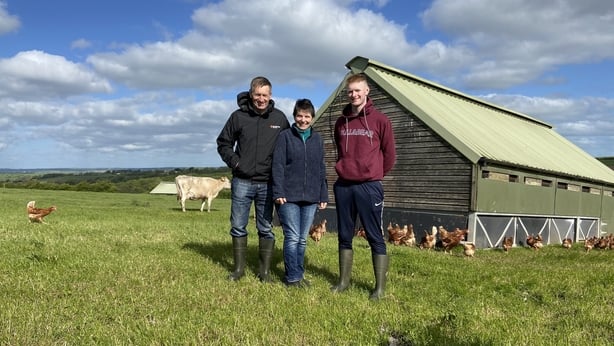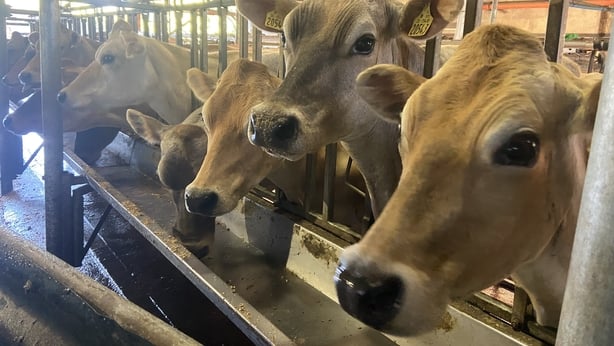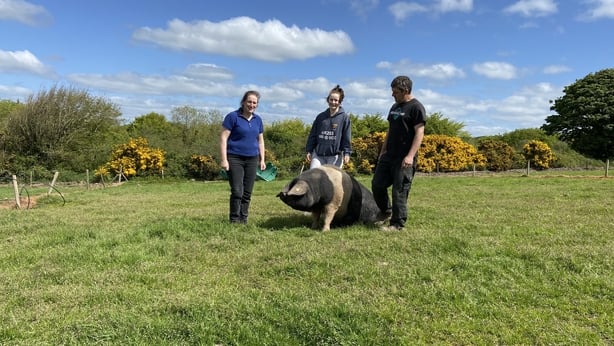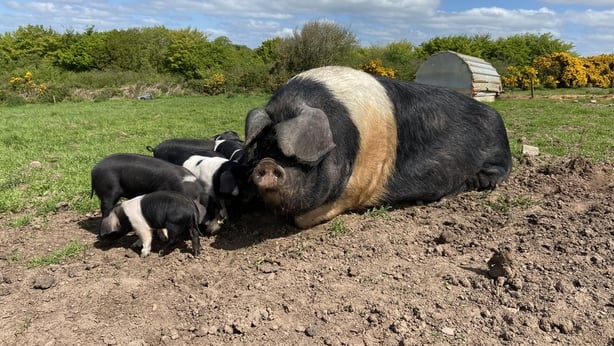Like many other businesses, the country's network of farmers' markets closed with little warning two months ago.
More importantly, in the case of stall-holders, there were no plans to deal with the food sold at the markets.
Cows kept producing organic milk, hens kept laying free-range eggs, farmers continued producing organic pork and bacon and to harvest ripening fruit and vegetables.
So, what's been happening down on the farm?
Dan Ahern and his wife Anne have farmed organically at Ballysimon near Midleton in east Cork for more than 20 years.

They have four adult children and, they say, organic farming has provided well for the family, whereas Dan would have had to take an off-farm job to supplement their farm income if they weren't farming organically.
"It wasn't really for any ethical reason, it was purely economical," Dan explains, "but since we have been organic we have been very happy with the decision and the fact that we don't put out fertilisers or sprays - it feels like a healthier way to farm."
We need your consent to load this rte-player contentWe use rte-player to manage extra content that can set cookies on your device and collect data about your activity. Please review their details and accept them to load the content.Manage Preferences
Dan and his son Seamus milk a herd of 110 Jersey cows. They produce half a million litres of organic milk and cream a year.
Much of it is sold at farmers' markets in Midleton and in Cork city.
They also supply the Village Dairy in Carlow with their milk, attracting a premium of up to 30% over milk that isn't organic.

Anne Ahern has a flock of 500 free-range hens. At peak time, in late spring and throughout the summer, they lay up to 350 eggs per day.
Anne used to sell the milk and eggs at farmers' markets, but when the lockdown came, the Aherns were left with a problem.
The milk was easily moved: the Ahern's herd of Jersey cows produce high quality milk, and local co-op Dairygold was happy to take the supply.
The eggs were a different matter: 30 dozen eggs per day is a lot of eggs, and they needed to be shifted!
Distribution among neighbours, with a table and an honesty box in the yard, only accounted for so much. Anne gifted the remainder to the Penny Dinners charity in Cork.
"We were in a bit of a dilemma, really, when the lockdown came, because it happened all of a sudden and then we had all these eggs every day. We took a good few of them up to Penny Dinners - they needed food and we were happy to give the eggs to them," Anne says.
The closure of the farmers' markets has dealt a substantial financial blow to the Ahern family farm but, without Government supports for them, both Anne and Dan say they have had no choice other than to take the hit.
"Farmers are generally very resilient. They're used to ups and downs," Dan says. "You have to be positive. You have to keep the sunny side up all the time."
The lockdown put an end - for now anyway - to any hopes Anne might have had of stepping back and taking things a little easier in the medium term.
Instead, Anne says, they will keep going, adding: "We live here and this is a piece of heaven and you have to be appreciative of what you have too."
At nearby Carrigtwohill, Dave Barry and his family grow vegetables on around 10 acres. Dave says the farmers' markets have made a huge difference, not just in financial terms.
"I grow every kind of vegetable I can grow," he says. "If something goes wrong, then everything isn't wrong. And I get a decent enough price. And I'm getting compliments, which I never got off a wholesaler in my life!"
Dave Barry was one of the lucky ones. He says lockdown came at the start of what he calls a "hungry gap" for him - in between seasons, when he wouldn't have had too much to sell anyway.
He still misses the markets, though.
We need your consent to load this rte-player contentWe use rte-player to manage extra content that can set cookies on your device and collect data about your activity. Please review their details and accept them to load the content.Manage Preferences
"I enjoy the markets - I really enjoy the craic. You miss it," Dave says. "You need a few pound coming in too. The market is my livelihood, really. I need it."
Noreen Conroy and her husband Martin have spent the past two decades building up their farm of 250 Saddleback pigs. They started with two.
Their Woodside Farm near Midleton is divided into paddocks, within which their pigs are free to roam and graze and rummage.

Noreen and Martin say their 30-acre farm has provided them with a livelihood to raise their five children there.
"Before the lockdown, the farmers' markets were 100% of our income and, when the lockdown came, that meant 100% of our income was gone," says Martin.
"We had no place to sell our products to the people, and the people had no place to get it (from us)."

Noreen says shutting the farmers' markets broke the link between the producer and the consumer, closing off a source of healthy, nutritious food.
"It was a huge cut to us when the farmers' markets were closed down - they are an essential part of our income," Noreen says.
We need your consent to load this rte-player contentWe use rte-player to manage extra content that can set cookies on your device and collect data about your activity. Please review their details and accept them to load the content.Manage Preferences
Noreen and Martin Conroy divided their time between looking after the pigs on the farm and selling their free-range pork, bacon and sausages at farmers' markets in the area.
Since the lockdown, they have been able to offset the financial loss by selling through an online farmers' market called NeighbourFood, but sales never came close to matching the markets.
Like everyone else, Noreen is looking forward to the return of the farmers' markets.
"We're looking forward to going back and meeting all our customers that we haven't met for weeks," she says.
"They have gone through their trauma and we have had our troubles as well.
"It will be good to get back and meet everybody and make sure everybody is okay, so that they are getting nutritious food again, which is something they should never have been stopped getting."
Around 150 farmers' markets are due to re-open around the country from Monday.
Already, hundreds of producers - like the Aherns, the Barrys and the Conroys - are working to ensure that they will be ready.
We need your consent to load this rte-player contentWe use rte-player to manage extra content that can set cookies on your device and collect data about your activity. Please review their details and accept them to load the content.Manage Preferences







